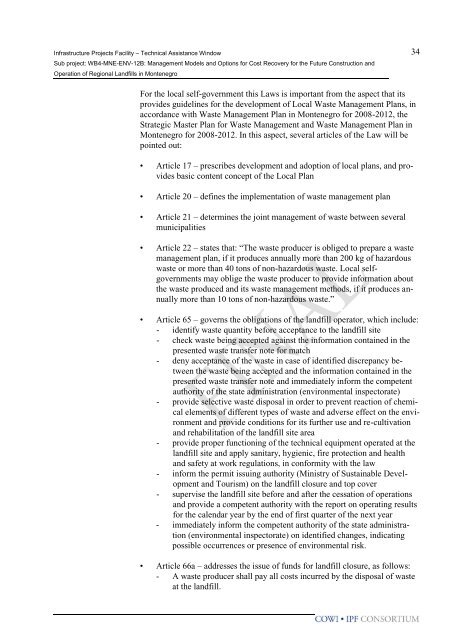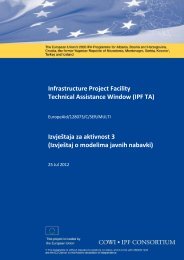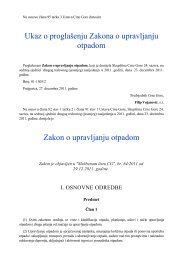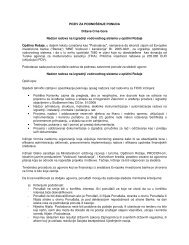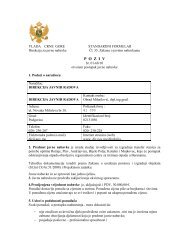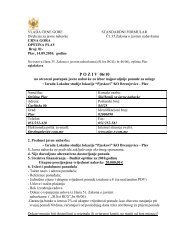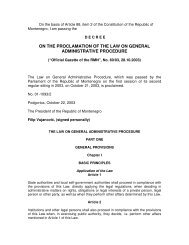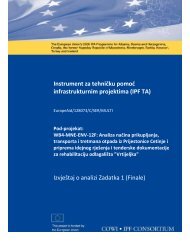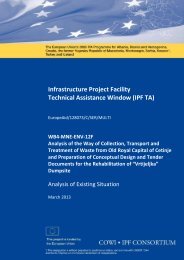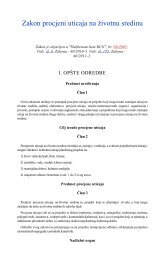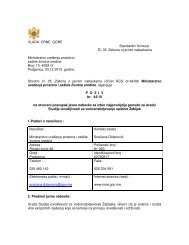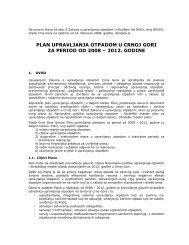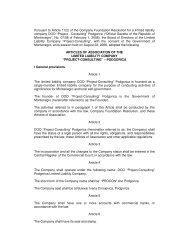Infrastructure Projects Facility Technical Assistance Window (IPF TA ...
Infrastructure Projects Facility Technical Assistance Window (IPF TA ...
Infrastructure Projects Facility Technical Assistance Window (IPF TA ...
You also want an ePaper? Increase the reach of your titles
YUMPU automatically turns print PDFs into web optimized ePapers that Google loves.
<strong>Infrastructure</strong> <strong>Projects</strong> <strong>Facility</strong> – <strong>Technical</strong> <strong>Assistance</strong> <strong>Window</strong><br />
Sub project: WB4-MNE-ENV-12B: Management Models and Options for Cost Recovery for the Future Construction and<br />
Operation of Regional Landfills in Montenegro<br />
34<br />
For the local self-government this Laws is important from the aspect that its<br />
provides guidelines for the development of Local Waste Management Plans, in<br />
accordance with Waste Management Plan in Montenegro for 2008-2012, the<br />
Strategic Master Plan for Waste Management and Waste Management Plan in<br />
Montenegro for 2008-2012. In this aspect, several articles of the Law will be<br />
pointed out:<br />
• Article 17 – prescribes development and adoption of local plans, and provides<br />
basic content concept of the Local Plan<br />
• Article 20 – defines the implementation of waste management plan<br />
• Article 21 – determines the joint management of waste between several<br />
municipalities<br />
• Article 22 – states that: “The waste producer is obliged to prepare a waste<br />
management plan, if it produces annually more than 200 kg of hazardous<br />
waste or more than 40 tons of non-hazardous waste. Local selfgovernments<br />
may oblige the waste producer to provide information about<br />
the waste produced and its waste management methods, if it produces annually<br />
more than 10 tons of non-hazardous waste.”<br />
• Article 65 – governs the obligations of the landfill operator, which include:<br />
- identify waste quantity before acceptance to the landfill site<br />
- check waste being accepted against the information contained in the<br />
presented waste transfer note for match<br />
- deny acceptance of the waste in case of identified discrepancy between<br />
the waste being accepted and the information contained in the<br />
presented waste transfer note and immediately inform the competent<br />
authority of the state administration (environmental inspectorate)<br />
- provide selective waste disposal in order to prevent reaction of chemical<br />
elements of different types of waste and adverse effect on the environment<br />
and provide conditions for its further use and re-cultivation<br />
and rehabilitation of the landfill site area<br />
- provide proper functioning of the technical equipment operated at the<br />
landfill site and apply sanitary, hygienic, fire protection and health<br />
and safety at work regulations, in conformity with the law<br />
- inform the permit issuing authority (Ministry of Sustainable Development<br />
and Tourism) on the landfill closure and top cover<br />
- supervise the landfill site before and after the cessation of operations<br />
and provide a competent authority with the report on operating results<br />
for the calendar year by the end of first quarter of the next year<br />
- immediately inform the competent authority of the state administration<br />
(environmental inspectorate) on identified changes, indicating<br />
possible occurrences or presence of environmental risk.<br />
• Article 66a – addresses the issue of funds for landfill closure, as follows:<br />
- A waste producer shall pay all costs incurred by the disposal of waste<br />
at the landfill.<br />
.


